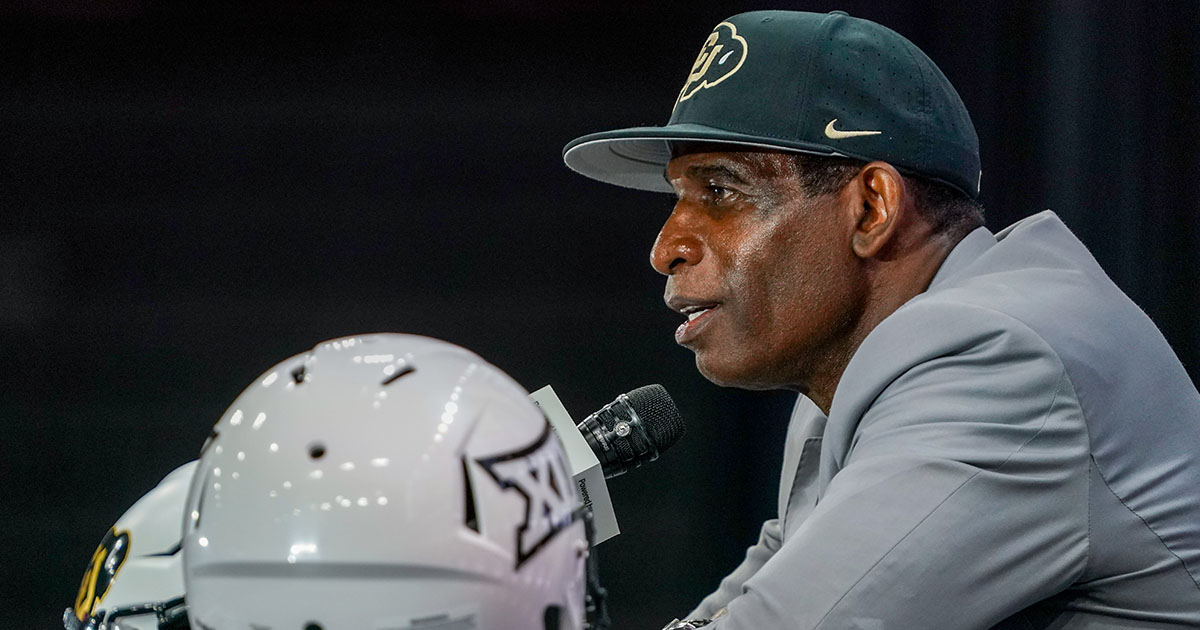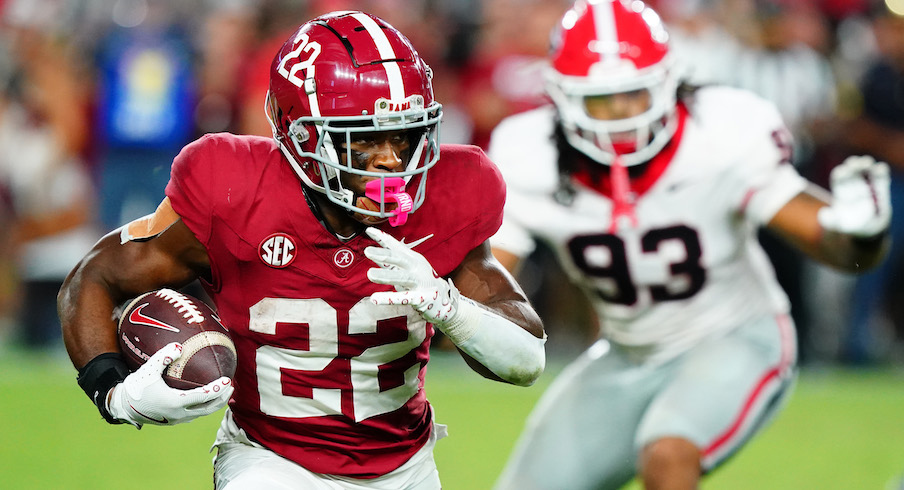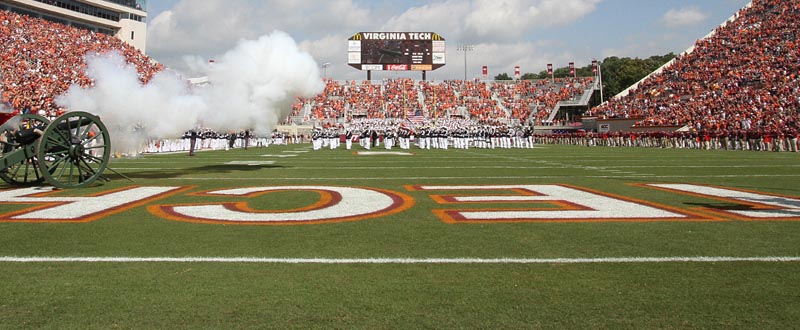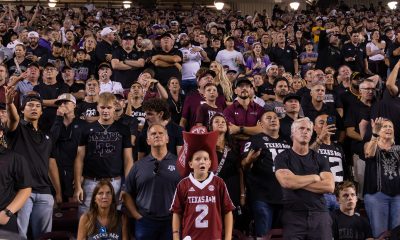NIL
What Georgia pays softball coach Tony Baldwin after 2024 extension
Georgia softball reached the NCAA Super Regional round this past season for the third straight year under coach Tony Baldwin. It came after a tough SEC season when a Bulldogs team with an overhauled roster did not win an SEC series in a conference that saw three teams reach the final four of the Women’s […]

Georgia softball reached the NCAA Super Regional round this past season for the third straight year under coach Tony Baldwin.
It came after a tough SEC season when a Bulldogs team with an overhauled roster did not win an SEC series in a conference that saw three teams reach the final four of the Women’s College World Series.
Georgia awarded Baldwin with a boost in pay and a three-year contract extension in a deal signed last September, according to a contract obtained by the Athens Banner-Herald in an open records request.
It keeps Baldwin under contract through the end of the 2029 season and raised his total pay to $325,000 annually. That’s an increase of approximately $87,000 for Baldwin, who just completed his fourth season as Georgia’s head coach.
Baldwin’s pay is still below at least nine other SEC coaches according to a salary survey from The Oklahoman.
As part of the deal, Baldwin’s total pay increases $25,000 each year of the deal to $350,000 starting July 1, 2025, $375,000 on July 1, 2026, $400,000 on July 1, 2027 and $425,000 on July 1, 2028.
Baldwin also received a $30,000 longevity bonus on Sept. 30, 2024 and receives a $25,000 longevity bonus one month after each season.
He was due to receive a $50,000 longevity bonus on July 31, 2026 under his original contract after he was promoted from associate coach under Lu Harris-Champer following the 2021 season when the Bulldogs last made the Women’s College World Series.
Georgia finished the 2025 season with a 35-23 record. It went 7-16 in the SEC but won an NCAA regional as a lower-seeded team at Duke.
“This was a very young team, we graduated a ton of seniors last year,” athletic director Josh Brooks said. “Really excited with the progress they made. With all due respect to Duke and every other conference, we went through a gauntlet in the SEC. I knew once we got to regionals…I felt good about our opportunity.”
Georgia lost a deciding game three against Florida in a Super Regional series in Gainesville, 5-2.
“We’ve taken our share of punches and shots and all of the setbacks and we’ve shown up every week to start the new week with a fresh mindset that this week’s going to be our week and you don’t get that without great senior people in your room,” Baldwin, who is 163-75 as head coach, said after the final game. “We had some shortcomings this year, but the reason that we played for a chance to go to the World Series today was because of the people we have in a room, and I’ll go to bat with that any time.”
Brooks said he feels good about where the program is with a young team and the additions it’s making in the transfer portal and through the high school ranks.
“We’re giving them support now, a brand new facility,” Brooks said of softball upgrades. “We got to showcase it at the SEC softball tournament. I think facilities still do matter. I know NIL has become a big thing, but for a sport like softball, not just for recruiting but for how a kid will be able to train and develop and where they’ll call home, I think matters. I think it will keep elevating that program.”
NIL
Deion Sanders doesn’t hold back on why certain college football teams keep winning
Colorado head coach Deion Sanders is pushing for a cap within the Name, Image and Likeness market as college football programs fight to stay competitive in the aftermath of the House settlement. While schools can share up to $20.5 million directly to student athletes this year, the revenue share cap doesn’t apply to third-party NIL […]

Colorado head coach Deion Sanders is pushing for a cap within the Name, Image and Likeness market as college football programs fight to stay competitive in the aftermath of the House settlement.
While schools can share up to $20.5 million directly to student athletes this year, the revenue share cap doesn’t apply to third-party NIL deals. Programs can work with outside partners to give athletes even more opportunities.
Sanders helped turn Colorado around in his second season at the helm, finishing at 9-4 after recording just four wins in 2023.
Despite the promising trajectory of the program, though, Sanders is wary about competing against programs with more backing from an NIL perspective.
“I wish there was a cap,” Sanders said Wednesday at Big 12 Media Days. “You know, like, the top-of-the-line player makes this, and if you’re not that type of guy, you know you’re not going to make that. That’s what the NFL does. So, the problem is you got a guy that’s not that darn good, but he could go to another school and give him a half a million dollars. And you can’t compete with that.”
Larger programs have a leg up in recruiting and maintaining top-tier talent. The last three national championship winners – Georgia, Michigan and Ohio State – were among the country’s biggest NIL spenders.
Ohio State reportedly spent around $20 million to field its national championship roster last season.
“All you have to do is look at the playoffs and see what those teams spent, and you’ll understand darn well why they’re in the playoffs,” Sanders said. “It’s kind of hard to compete with somebody who’s giving 25-30 million dollars to a darn freshman class.”
“It’s crazy,” Sanders continued. “We’re not complaining, because all these coaches up here can coach their butts off… But what’s going on right now don’t make sense. We want to say stuff, but we’re trying to be professional… But the team that pays them more, pays the most, is going to be there in the end.”
All third-party deals totaling over $600, in light of the House settlement, are subject to the NIL Go clearinghouse. That process could begin to reign in unsustainable deals and provide more of an equal playing field.
However, the effectiveness is, and will continue to be, under question, as the current landscape was just instituted on July 1.
NIL
‘Don’t Make Sense’ — Colorado HC Deion Sanders Provides Alternate NIL Idea Amid Inequality in College Football
Deion Sanders stood at the podium during Big 12 Media Days with a message that addressed college football’s biggest problem. The Colorado head coach wasn’t mincing words about NIL deals and the chaos they’ve created. His solution? Stop pretending the current system works and start copying what does. Dive into Try out PFSN’s FREE college […]

Deion Sanders stood at the podium during Big 12 Media Days with a message that addressed college football’s biggest problem.
The Colorado head coach wasn’t mincing words about NIL deals and the chaos they’ve created. His solution? Stop pretending the current system works and start copying what does.

Why Does Colorado HC Deion Sanders Think NIL Creates an Unfair Playing Field?
The college football landscape has shifted rapidly, largely due to the rise of NIL deals. While these opportunities benefit student-athletes, they have also deepened the divide between powerhouse programs and those with limited funding.
Wealthier schools now leverage major donor support and lucrative endorsements to secure elite talent, leaving smaller programs struggling to compete. As these major developments continue to unfold, Sanders has closely monitored them, expressing concern about the NCAA’s uncertain role in this evolving system.
Colorado head coach Deion Sanders has reemerged on the college football stage, and with him comes a renewed critique of the current state of NIL deals. Speaking at Big 12 Media Days, Sanders didn’t hold back while addressing the competitive disparity NIL has introduced into the sport.
He pointed directly at the imbalance in spending among programs and its visible impact on postseason appearances. “All you gotta do is look at the [CFP] and see what those teams spent, and you’ll understand darn well why they’re in the playoffs,” Sanders said.
His frustration was rooted not in the principle of player compensation, which he supports, but in the lack of structure guiding it. Sanders voiced concern over how programs now land recruits based primarily on NIL money rather than coaching or development.
“All you gotta do is look at the [CFP] and see what those teams spent, and you’ll understand darn well why they’re in the playoffs.”
Deion Sanders on NIL and the current state of college football. pic.twitter.com/y6A5C3dWUP
— ESPN (@espn) July 9, 2025
“You got a guy that’s not that darn good, but he could go to another school and they give him a half a million dollars and you can’t compete with that,” he said. “We’re not complaining because all these coaches up here could coach their butts off… but what’s going on right now don’t make sense.”
Sanders noted that schools with the largest donor bases are stockpiling talent, while others simply can’t keep pace financially.
“And you’re talking about equality, not equality, like equal, I guess, equality. And all you have to do is look at the playoffs and see what those teams spent, and you understand darn they’re wider in the playoffs.”
What Solution Does Sanders Propose for College Football’s NIL Problem?
Sanders has long advocated for NIL regulations and, earlier in April, proposed a clear solution: a salary cap mirroring the NFL’s structure.
“There should be some kind of cap,” he said in an interview with USA Today‘s Jarrett Bell. “Our game should emulate the NFL game in every aspect. Rules. Regulations. Whatever the NFL rules, the college rules should be the same.”
Sanders believes a structured cap would allow fairness to prevail across programs of varying size and resources. This approach would level the playing field by preventing the wealthiest programs from simply outspending their competition for top talent.
RELATED: Colorado HC Deion Sanders Takes Cheeky Jab at Texas Tech HC Joey McGuire’s Transfer Portal Activity While Praising Red Raiders
However, the current trajectory suggests his concerns are only growing. As part of a recently approved antitrust settlement in the House v. NCAA case, schools will soon be permitted to share up to $20.5 million annually with athletes. However, for Sanders, that measure falls short of addressing the core issue.
“It’s kind of hard to compete with somebody who’s given $25, $30 million to a darn freshman class,” he said, pointing out the growing gap between schools flush with cash and those without such advantages.
Sanders’ message was direct and uncompromising. Without firm guidelines, the sport risks becoming a predictable cycle dominated by the wealthiest programs. His NFL-style salary cap proposal represents a fundamental shift toward structured competition rather than the current free-for-all approach that has transformed college recruiting into a bidding war.
NIL
Deion Sanders calls for rev-share cap, points out spending among College Football Playoff teams
With the revenue-sharing era well underway in college football, coaches are evaluating the state of the landscape. Schools are now able to directly share up to $20.5 million with athletes as part of the House v. NCAA settlement. Colorado coach Deion Sanders sees a way to further settle things, though. Speaking during a roundtable at […]

With the revenue-sharing era well underway in college football, coaches are evaluating the state of the landscape. Schools are now able to directly share up to $20.5 million with athletes as part of the House v. NCAA settlement.
Colorado coach Deion Sanders sees a way to further settle things, though. Speaking during a roundtable at Big 12 Media Days on Wednesday, Coach Prime called for a cap on rev-share dollars to shift things toward an NFL-like operation.
To illustrate his point, Sanders pointed out last year’s College Football Playoff and the conversations around roster costs. National champion Ohio State made headlines with its roster, worth upward of $20 million.
“I wish there was a cap,” Sanders said during the panel. “Like, the top-of-the-line player makes this and if you’re not that type of guy, you know you’re not going to make that. That’s what the NFL does. The problem is, you’ve got a guy that’s not that darn good, but he could go to another school and they give him another half a million dollars. You can’t compete with that. It don’t make sense.
“You talk about equality … all you have to do is look at the playoffs and see what those teams spent, and you understand darn near why they’re in the playoffs. It’s kind of hard to compete with somebody who’s giving $25, $30 million to a darn freshman class. It’s crazy.”
Ohio State’s 2024 roster was considered one of the more expensive rosters in college football last season as the Buckeyes took down Notre Dame to win the national championship. This year, though, roster costs continued to grow as teams braced for the House v. NCAA settlement.
On3’s Pete Nakos previously reported those figures soared toward $25 to $30 million on the higher end before the settlement’s approval. Once Judge Claudia Wilken issued her order, the NIL Go clearinghouse went into effect for deals worth at least $600. That led to frontloading of deals during recruitments prior to final approval.
But even with the rising costs of rosters and the ever-changing landscape, Deion Sanders said coaches still have to develop players. That said, he also reiterated what spending big money on a roster can do when the postseason comes around.
“We’re not complaining, because all these coaches up here can coach their butts off and given the right opportunity with the right players and to play here and there, you’ll be there,” Sanders said. “But what’s going on right now don’t make sense. We want to say stuff, but we’re trying to be professional.
“But you’re going to see the same teams darn near at the end, and with somebody who sneaks up in there, the team that pays the most is going to be there in the end.”
NIL
CFB revenue-sharing causing massive shift in NIL collectives, private equity money
The world of college sports has shifted more in the last few years than it has in almost its entire existence. With NIL, the transfer portal, and more popping up and changing in the blink of an eye, it can be hard to keep up with everything happening. With the most recent change, or adjustment, […]

The world of college sports has shifted more in the last few years than it has in almost its entire existence. With NIL, the transfer portal, and more popping up and changing in the blink of an eye, it can be hard to keep up with everything happening.
With the most recent change, or adjustment, the House settled with the NCAA and ruled that colleges and universities could directly pay their athletes, a virtual pay-to-play situation for college athletes.
You might be thinking, “How is that any different from the NIL collectives and funds that have been in place for the past couple of years?”
Honestly, that’s a really great question, one that even some college athletic departments are trying to grapple with as we speak. These universities built million-dollar funds through boosters, donations, NIL deals, and more.
Now, those funds are rapidly getting cut as schools no longer have to use a “workaround” to get their players the most amount of money possible. Yet another shift in college sports.
The NIL Go Clearinghouse was created within the House settlement as a virtual vetting system for various NIL deals that continue to pop up, even with programs directly paying athletes, and is run by the brand-new College Sports Commission.
Beyond NIL deals and getting a paycheck signed over to them by their teams, college athletes now have a big question surrounding them:
“Is it possible for private equity funds to pay collegiate athletes without crossing any of the House settlement lines?
For now, the answer is still unknown. Colleges are having to look between the lines to ensure that they aren’t walking themselves or their players into a sticky situation, mainly because this has never been a situation before.
Currently, the Texas Tech Red Raiders are the frontrunners in the learning curve, already writing a three-year $5.1 million check over to five-star offensive tackle Felix Ojo, and preparing to write an even bigger one to land LaDamion Guyton, the No. 1 prospect in the class of 2027.
To put it simply, most questions you’re possibly asking are being asked by everyone else, including the bigwigs in the NCAA and athletic departments. Most of the answers to those questions are still unknown, and may be for quite a while.
NIL
Jayden Anderson Enters The Transfer Portal
Virginia Tech true freshman wide receiver Jayden Anderson has entered the transfer portal. The news was first reported by On3. Anderson signed with the Hokies out of Green Run High School (Virginia Beach) last December, and he enrolled at Virginia Tech this summer. The slot receiver prospect was the No. 20 prospect in Virginia by […]



Virginia Tech true freshman wide receiver Jayden Anderson has entered the transfer portal. The news was first reported by On3.
Anderson signed with the Hokies out of Green Run High School (Virginia Beach) last December, and he enrolled at Virginia Tech this summer. The slot receiver prospect was the No. 20 prospect in Virginia by the 247Sports composite rankings, and he was expected to redshirt his season.
Anderson’s departure leaves the Hokies with 95 scholarship players, including 12 wide receivers.
NIL
NIL Spending Influences College Football Playoff, Says Deion Sanders
During Big 12 Media Days, Colorado head coach Deion Sanders made headlines with his staunch critique of the current NIL landscape in college football. He expressed concerns that the unregulated spending on athletes creates an imbalance, favoring wealthier programs. Sanders argued that the teams with the biggest financial resources, not necessarily the best coaching or […]

During Big 12 Media Days, Colorado head coach Deion Sanders made headlines with his staunch critique of the current NIL landscape in college football. He expressed concerns that the unregulated spending on athletes creates an imbalance, favoring wealthier programs. Sanders argued that the teams with the biggest financial resources, not necessarily the best coaching or player development, dominate the College Football Playoff. He noted that programs are investing exorbitantly into recruiting, leading to a competitive hierarchy rooted in financial backing rather than merit. His comments highlight the pressing need for a structured approach to NIL compensation in college sports.
By the Numbers
- Some programs are reportedly offering 25–30 million for a single freshman recruiting class.
- Sanders’ Colorado Buffaloes finished last season with a record of 9-4, including a bowl loss to BYU.
State of Play
- Various college football programs are engaging in a financial arms race to attract top talent.
- Sanders’ comments reflect a growing concern among coaches and players about the influence of money in recruiting.
What’s Next
As the dialogue around NIL spending intensifies, it could prompt discussions among NCAA leadership regarding potential regulations or caps on compensation. This tension may lead programs to either invest more heavily in recruiting or advocate for more equitable compensation structures. The outcome could redefine competitive balance and strategy in college football.
Bottom Line
Deion Sanders’ remarks underscore a critical crossroads for college football, where financial power is eclipsing traditional values of skill and teamwork. His call for regulations highlights an urgent need for reform to ensure that competition remains fair and based on athletic ability rather than budget size. The future of college sports hangs in the balance as stakeholders weigh the implications of endless NIL spending.
-

 Technology2 weeks ago
Technology2 weeks agoPet fitness and wellness trends for a healthier and happier dog
-

 College Sports2 weeks ago
College Sports2 weeks agoWAC to Rebrand to UAC, Add Five New Members in 2026
-
College Sports3 weeks ago
Women's Basketball Thanks Shannon LeBeauf for 14 Seasons
-

 Motorsports1 week ago
Motorsports1 week agoWhy Cosmetics are Making Up for Lost Time in Women’s Sports
-

 Professional Sports3 weeks ago
Professional Sports3 weeks agoAlex Pereira responds to rumors of UFC heavyweight title fight with threatening message
-

 College Sports3 weeks ago
College Sports3 weeks agoAlabama Basketball
-

 Professional Sports3 weeks ago
Professional Sports3 weeks agoFrancis Ngannou sends Dana White a message following Jon Jones' shock UFC retirement
-

 College Sports2 weeks ago
College Sports2 weeks agoA new era of Dickinson hockey begins behind the bench – The Dickinson Press
-

 Motorsports2 weeks ago
Motorsports2 weeks agoNASCAR This Week – Patriot Publishing LLC
-

 Sports2 weeks ago
Sports2 weeks agoSEC Conference imposing a fine will create the opposite effect.










 | #Shorts
| #Shorts






 – Bobby Marks breaks down Bucks’ finances waiving Damian Lillard | Get Up
– Bobby Marks breaks down Bucks’ finances waiving Damian Lillard | Get Up













